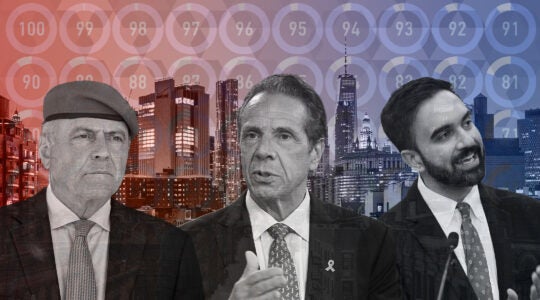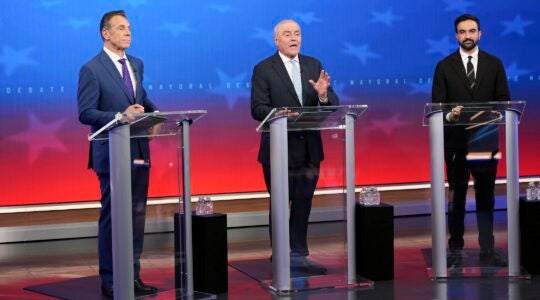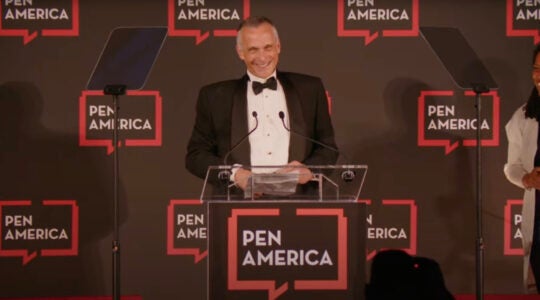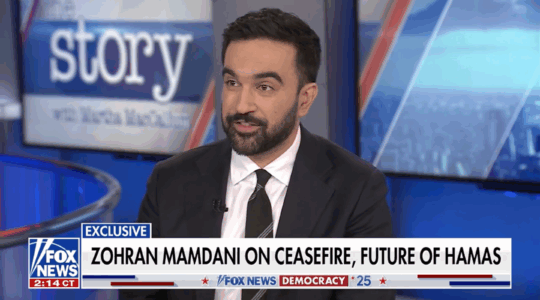
Glenn Beck, left, and Republican presidential hopeful Michele Bachmann both addressed the Zionist Organization of America’s annual dinner in New York on Nov. 20. (Ben Harris)
NEW YORK (JTA) – The Zionist Organization of America’s annual dinner is a place where conventional thinking about the liberal proclivities of American Jews goes to die. But never quite like Sunday night — when Tea Party darling and Republican presidential hopeful Michele Bachmann served as the opening act and Glenn Beck was swarmed like a rock star.
Beck, who was on hand to receive the ZOA’s Defender of Israel Award, made his way into the VIP reception at the Grand Hyatt Hotel in Manhattan shortly after 5 p.m. and almost instantly was beset by a crush of admirers. He found himself wedged into a corner as a crowd of well-wishers surged forward to have their photographs taken with him. Bachmann and her fellow Republican congresswoman, Florida’s Ileana Ros-Lehtinen, were there, too — but it was clear who the star was.
“Love, love, love, love, love,” Ros-Lehtinen said, extending her hand to Beck, who responded by clasping hers in both of his. All around her, an expanding mass of people pressed in closer, seemingly eager to express the same sentiment.
“I need everyone to back up please,” a photographer practically yelled as he tried to create a cordon around the VIPs to set up his shot. But despite help from Beck’s two bodyguards, an assistant, and assorted publicists and ZOA personnel, the crowd kept pushing ahead.
Crowd control proved to be a recurring problem at the dinner. After the appetizer was served, seemingly half the room converged on Beck and his wife, Tania, tying up the traffic flow in the center of the ballroom and rendering the area impassable. A succession of ZOA officials implored the crowd to sit down so servers could get dinner on the table, but with little effect.
Grabbing the microphone, ZOA President Morton Klein, raised his voice — the first of several times he would do that over the course of the evening — and commanded those standing around to “sit down — NOW!”
Even for a crowd that’s been known to get weak in the knees for foreign policy hawks — including Rep. Shelley Berkley (D-Nev.,), one-time Republican presidential candidate Gary Bauer and leading Bush administration neocon John Bolton — the euphoria surrounding Beck’s appearance stood out. And even for a ZOA dinner, the night was unusually partisan: Of the six members of Congress in attendance, all were Republicans. Anthony Weiner had been a regular attendee in past years, as were fellow New York Democrats Nita Lowey and Eliot Engel. And though Klein announced that Sen. Charles Schumer (D-N.Y.) said he would attend, New York’s senior senator was nowhere in evidence.
Schumer’s office did not respond to a request for comment.
The Democratic officeholders didn’t seem to be missed. The polls could be right that nearly 80 percent of American Jews voted for Barack Obama and more than half believe Israel should dismantle at least some settlements as part of a final agreement with the Palestinians. But not in this room.
Bachmann’s cry of “not one inch” brought guests to their feet and prompted screams of “Bachmann for president.” In his remarks, Klein assailed the Anti-Defamation League and the American Jewish Committee – “Yes, I name names” — for their opposition to a bill on foreign funding of nongovernmental organizations. The measure has been decried by liberals, centrists and even some conservatives, in Israel and abroad, as a grave threat to Israeli democracy.
And Ros-Lehtinen, in a freewheeling and often sarcastic speech, singled out two women in the audience from the West Bank settlement of Kedumim, sardonically identifying them as the obstacles to peace.
“They look harmless,” Ros-Lehtinen said, “but you never know.”
Bachmann began her talk, which sounded much like a campaign stump speech tailored to Jewish ears — well, certain Jewish ears — by invoking the line in Genesis promising that those who bless Israel will be blessed. It’s precisely that sort of religiously inflected politicking that gives many American Jews the willies. But the ZOA crowd is not one to get much exercised about the confluence of God and politics. A clear majority of men in the room wore yarmulkes and speakers repeatedly invoked God’s promise of Israel to the Jews.
After a taped message from Prime Minister Benjamin Netanyahu praising Beck went off with only a minor technical glitch, the emcee quipped, “I think that proves that God is on our side because the video actually worked.”
As for Beck, who was introduced by billionaire businessman-philanthropist and Netanyahu-backer Sheldon Adelson, he is arguably the most polarizing media figure in Jewish life. Hundreds of liberal rabbis signed a letter in January asking that he be sanctioned for “completely unacceptable” use of the Holocaust and Nazi imagery. He has urged his listeners to quit their church or synagogue if “social justice” is part of its mission. And in a two-part series that accused left-wing financier and Jewish Holocaust survivor George Soros of collaborating with the Nazis, Beck flirted with what some critics saw as anti-Semitic conspiracies of Jewish control of media and finance.
Occasionally Beck has apologized — as he did after he compared Reform rabbis to Islamists — and then gone on to offend again.
It was in the wake of the Soros spat, when several Jewish groups lined up to express their outrage, that the ZOA bucked the trend. In a news release, Klein said that Beck’s comments were “essentially accurate” and that Soros “merits no defense or sympathy from Jewish leaders.”
“Glenn Beck got in touch with me, thanked me for writing this because no one else in the organized Jewish world was defending him, and he asked if we could get together,” Klein told JTA. “We got together, I asked him if he’d be our honoree, he began to almost cry. Tears welled up in his eyes.”
Asked about the discomfort some feel with Beck’s repeated use of Holocaust analogies, Klein, a child of survivors who was born in a German displaced persons camp, claimed ignorance, saying he didn’t watch Beck’s show often enough to have an opinion.
“I just don’t know,” he said.
That Beck, an unabashed crier, became misty at Klein’s offer is eminently believable. Beck appeared to choke back tears at least four times during his hourlong speech — and that was during his less emotional moments.
When he wasn’t battling the urge to cry, he was issuing a battle cry. With arms flailing wildly and face turning the color of the red caviar served in the VIP room, Beck portrayed the challenges facing Israel and the Jewish people in apocalyptic terms — as the ultimate showdown between good and evil. Beck was the only speaker at the dinner whose voice reached a pitch more feverish than Klein’s.
Beck said he came to the ZOA as a brother. “It’s personal,” he said repeatedly.
And clearly he has not been chastened by the urgings of some Jewish groups to tread lightly with the Holocaust analogies. Again and again he invoked them, saying the world stood on a precipice like the one it faced in 1939 — only this time it’s worse, as not only is the world ignoring rising evil, he said, it is actively helping it along.
“America is not a collective,” Beck thundered. “America is built on the individual. I am a man and I demand to be counted so others are not numbered again.”
The crowd went wild.
JTA has documented Jewish history in real-time for over a century. Keep our journalism strong by joining us in supporting independent, award-winning reporting.





